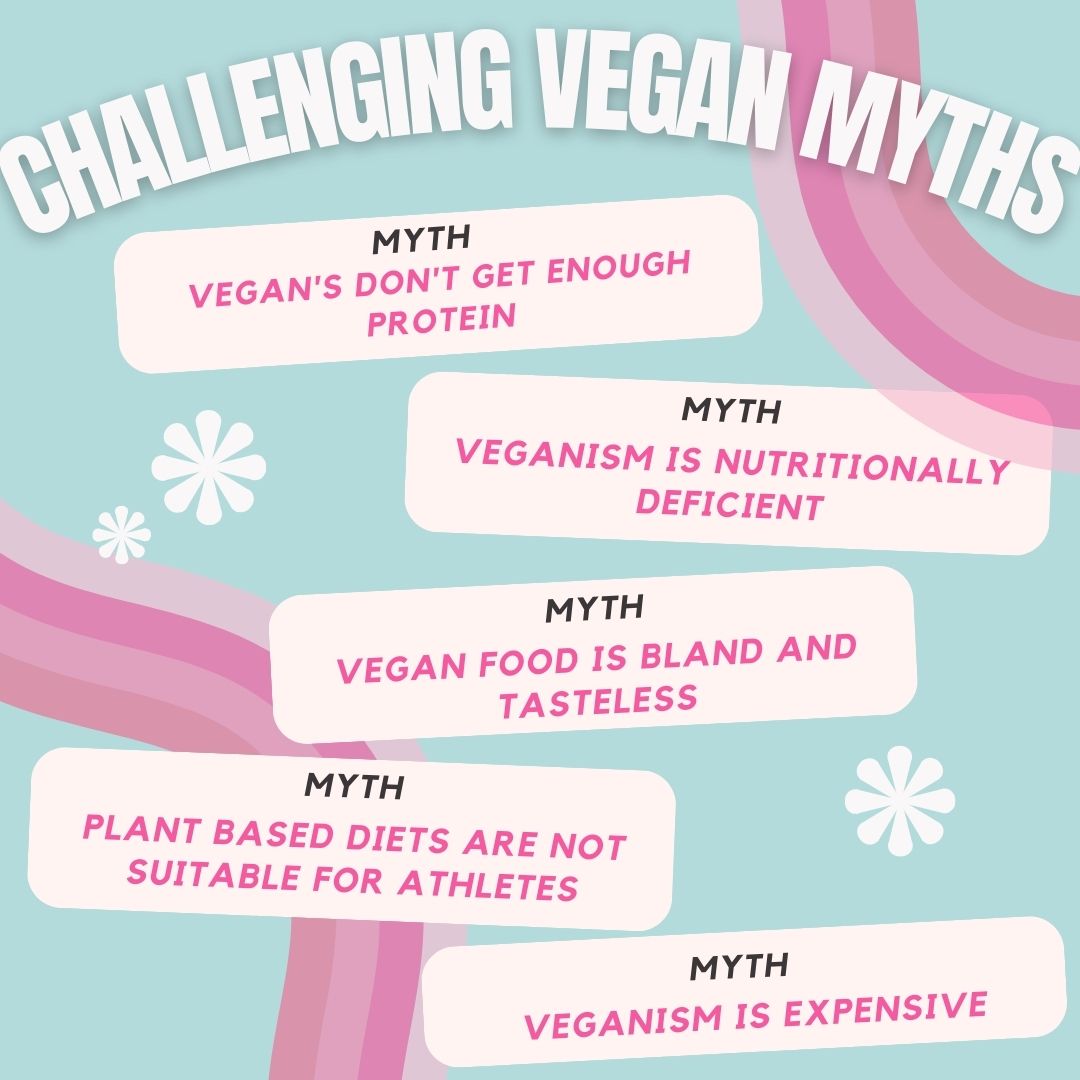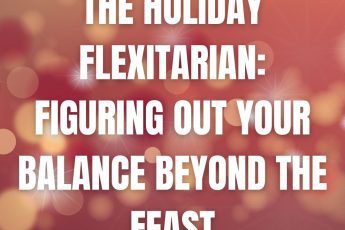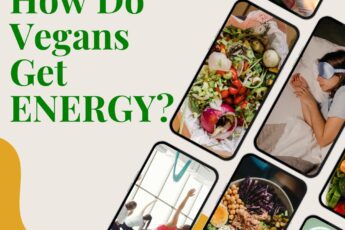Let’s face it—there are a lot of vegan myths floating around. Maybe you’ve heard it’s expensive, not healthy, or just too hard to keep up with. If you’ve been curious about going plant-based (or just want to eat more plants), chances are you’ve bumped into at least a few of these myths.
The truth? A plant-based lifestyle can be simple, affordable, and nourishing—with some great perks for your health, your wallet, and the planet.
And just a quick heads-up before we dive in—I’m not a doctor or dietitian. I’m here to share what I’ve learned and bust some of the most common vegan myths out there. Everyone’s body and journey are different, so it’s always a good idea to check in with your healthcare provider to figure out what works best for you.
Breaking Down the Most Common Vegan Myths
Let’s clear the air and bust 10 of the most common vegan myths—and give you the tools to make plant-based living actually work for you.
Myth #1: “You can’t get enough protein on a plant-based diet.”
One of the most widespread vegan myths. But plants are packed with protein—think lentils, tofu, beans, quinoa, tempeh, and even vegetables.
The Academy of Nutrition and Dietetics (the largest organization of food and nutrition pros in the U.S.) says that well-planned vegetarian and vegan diets are nutritionally adequate and can offer health benefits. SEE THE ACADEMY’S OFFICIAL POSITION PAPER.
✨ Try this: Rotate your proteins—make a lentil soup one night, toss chickpeas into your salad, or stir-fry tofu with veggies and rice.
Myth #2: “Plant-based eating is expensive.”
Some people assume it means $12 vegan cheese or specialty items every week. But the heart of a plant-based diet is built around staples like rice, beans, oats, frozen veggies, potatoes, and peanut butter.
In fact, a 2021 study from Oxford University found that eating plant-based can cut grocery costs by up to 29%. View the article: SUSTAINABLE EATING IS CHEAPER AND HEALTHIER.
✨ Try this: Focus on whole-food staples. If you’re not sure what to buy, check out my guide to PLANT-BASED STAPLES for your vegan kitchen.
Myth #3: “You have to go 100% vegan overnight.”
Nope! Going all-in isn’t required. In fact, easing into it often leads to more lasting changes.
✨ Try this: Start with one plant-based meal a day—like oatmeal for breakfast or a veggie-packed stir-fry for dinner. Let it grow from there.
Myth #4: “You won’t feel full without meat.”
Feeling satisfied is all about fiber, healthy fats, and protein—all of which you can get from plants. Fiber, in particular, helps you feel full longer, and plant-based foods are full of it.
✨ Try this: Add healthy fats (like avocado or tahini) and protein (like beans or lentils) to your meals. Whole grains like brown rice and oats also help you stay fuller longer.
Myth #5: “Plant-based diets are automatically healthy.”
Not always! French fries, soda, and vegan cookies are still processed foods. A healthy plant-based diet focuses on whole foods, not just what’s missing (like meat or dairy).
✨ Try this: Aim for mostly whole, unprocessed foods—veggies, fruits, whole grains, legumes, nuts, and seeds. Explore the “Whole Foods Plant-Based Diet” concepts online to give you ideas how to maximize the best foods in the plant-based spectrum
Myth #6: “You’ll be tired or weak without meat.”
This myth keeps people stuck. But studies show that plant-based diets can support energy levels and even athletic performance.
In fact, many top athletes in all sports are turning to a plant-based diet—and the science is backing them up. The documentary GAME CHANGERS takes a deep dive into how plant-based eating can fuel performance, strength, and recovery.
✨ Try this: In addition to the protein recommended above, include iron-rich foods like lentils, spinach, and fortified grains, and don’t forget B12 (a common supplement for vegans and non-vegans alike).
Myth #7: “It’s hard to get all your nutrients.”
You can get everything you need from a well-planned plant-based diet. The key is variety—eat the rainbow and include fortified foods or supplements for B12 and sometimes D.
✨ Try this: Mix up your meals. A colorful plate usually means a nutrient-rich plate.
Myth #8: “You’ll lose muscle if you stop eating meat.”
Not true! Many plant-based athletes (including Olympic-level pros) thrive without animal protein. Muscle is built with resistance training and adequate protein, which plants can easily provide.
✨ Try this: Pair strength training with foods like tofu, tempeh, lentils, and protein-rich grains like farro or quinoa.
Myth #9: “You’ll miss your favorite comfort foods.”
These days, almost any recipe can be made plant-based—from mac & cheese to burgers to chocolate chip cookies. It’s easier than ever to veganize your faves.
✨ Try this: Craving comfort food? Search for plant-based versions of your favorites—you might even like them better! From individual recipes to these PLANT-BASED SWAPS, there’s a plant-based twist for just about any classic dish. Just keep in mind that while these options can totally hit the spot, they’re often more about comfort than health—perfect for the occasional craving.
Myth #10: “Veganism is just a trend.”
The movement toward plant-based eating is grounded in real science—supporting health, reducing chronic disease risk, and lowering environmental impact. This isn’t a trend—it’s a long-term shift.
✨ Try this: Focus on your “why.” Whether it’s for your health, the environment, or compassion for animals, staying connected to your reason helps keep you motivated.
Bonus Myth: “Vegan food is boring.”
Absolutely not. Plant-based cooking is full of color, flavor, spice, and variety. Global cuisines offer tons of naturally plant-based dishes—curries, grain bowls, stir-fries, tacos, and more.
✨ Try this: Experiment with new spices or herbs to keep things fun. Plant-based eating can be anything but boring.
Make It Work: Simple Action Plan
Feeling inspired? Here’s how to take the next step:
- Pick one meal a day to make plant-based. Breakfast is a great starting point!
- Stock up on staples—beans, grains, frozen veggies, and easy sauces make fast meals doable.
- Plan just 3 meals for the week to start. Keep it simple (think: chili, stir-fry, and pasta).
- Add, don’t subtract—focus on all the delicious foods you can eat, rather than what you’re leaving out.
- Find support—follow a few plant-based creators or connect with like-minded friends for ideas and encouragement.
Want help getting started? Check out all the ideas and tools on our website OrganizingAPlantBasedLife.com for easy meals, a grocery list, and helpful swaps to make your transition super simple.
Final Thoughts
There are a lot of vegan myths out there, but most of them fall apart when you take a closer look. Going plant-based doesn’t have to be hard or extreme—it can be flexible, flavorful, and fun.
Whether you’re curious, just starting out, or already deep into your plant-based journey, you’re doing something great for your health and the planet—one bite at a time.
Got a vegan myth you’ve heard lately? Drop it in the comments—I’d love to hear it (and maybe help bust it too!).






